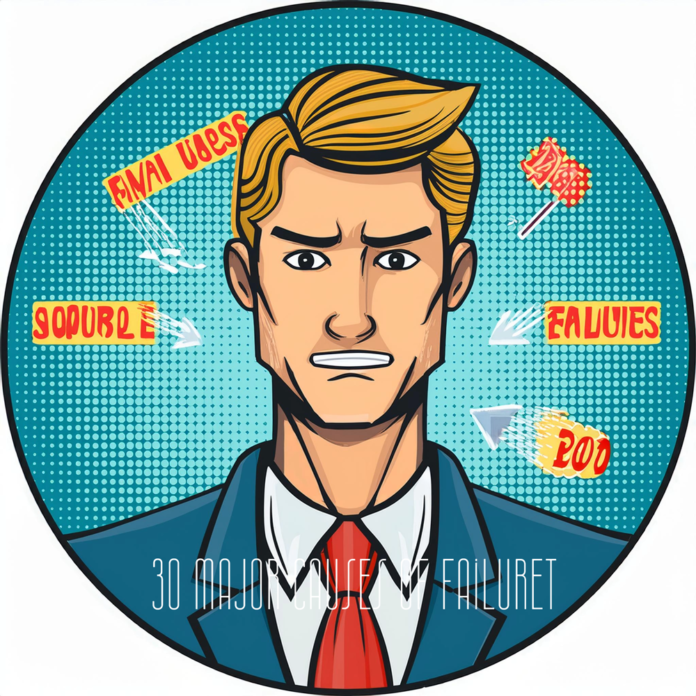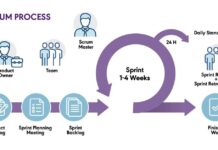In “Think and Grow Rich,” Napoleon Hill identifies 30 major causes of failure that can hinder an individual’s ability to achieve success. Understanding these pitfalls can help individuals avoid them and create a more effective path to their goals. Here are the 30 causes of failure, according to Hill:
- Unfavorable Hereditary Background: Lack of a sound physical constitution at birth, although Hill emphasizes that this is rarely an insurmountable obstacle.
- Lack of a Well-Defined Purpose in Life: Without a clear goal, individuals cannot effectively focus their efforts.
- Lack of Ambition to Aim Above Mediocrity: Settling for less and lacking the drive to achieve more.
- Insufficient Education: Education includes both formal schooling and self-taught knowledge. Hill stresses the importance of continuous learning.
- Lack of Self-Discipline: Inability to control emotions and impulses, leading to a lack of consistency in actions.
- Ill Health: Poor health can be a significant barrier to success. Hill advocates for maintaining good health through proper diet, exercise, and habits.
- Unfavorable Environmental Influences during Childhood: Negative influences in early life can shape one’s mindset and behavior negatively.
- Procrastination: Delaying actions and decisions prevents progress.
- Lack of Persistence: Giving up too easily when faced with obstacles.
- Negative Personality: Inability to get along with others due to a negative disposition.
- Lack of Controlled Sexual Urge: Mismanagement of sexual energy can lead to distractions and unproductive behavior.
- Uncontrolled Desire for “Something for Nothing”: Seeking quick and easy gains without putting in the necessary effort.
- Lack of a Well-Defined Power of Decision: Indecisiveness can lead to missed opportunities and failure to act.
- One or More of the Six Basic Fears: Fear of poverty, criticism, ill health, loss of love, old age, and death can paralyze individuals.
- Wrong Selection of a Mate in Marriage: A poor marital relationship can lead to a lifetime of misery and distraction.
- Over-Caution: Excessive caution can prevent taking necessary risks for growth and success.
- Wrong Selection of Associates in Business: The people you associate with can significantly impact your success.
- Superstition and Prejudice: Irrational beliefs and biases can cloud judgment and decision-making.
- Wrong Selection of a Vocation: Engaging in work not aligned with one’s interests or abilities.
- Lack of Concentration of Effort: Scattering one’s energies and efforts across too many activities.
- The Habit of Indiscriminate Spending: Mismanaging finances can lead to a lack of resources when needed.
- Lack of Enthusiasm: A lack of passion for one’s work can lead to mediocrity and failure.
- Intolerance: The inability to accept different views and perspectives can limit growth and opportunities.
- Intemperance: Overindulgence in any form can lead to a loss of control and focus.
- Inability to Cooperate with Others: Success often requires teamwork and collaboration.
- Possession of Power Not Acquired through Self-Effort: Power gained without effort is often misused and lost.
- Intentional Dishonesty: Lack of integrity can destroy trust and relationships essential for success.
- Egotism and Vanity: Excessive pride and self-importance can alienate others and lead to poor decisions.
- Guessing Instead of Thinking: Making decisions based on assumptions rather than thorough analysis.
- Lack of Capital: Insufficient funds to support initial business ventures or personal development efforts.
Hill encourages readers to conduct an honest self-assessment to identify which causes may be holding them back and take proactive steps to address them. This self-awareness is key to overcoming obstacles and achieving success.
General Self-Analysis Questions:
- Do you complain often of “feeling bad,” and if so, what is the cause?
- Do you find fault with other people at the slightest provocation?
- Do you frequently make mistakes in your work, and if so, why?
- Are you sarcastic and offensive in your conversation?
- Do you deliberately avoid the association of anyone, and if so, why?
- Do you suffer frequently with indigestion? If so, what is the cause?
- Does life seem futile and the future hopeless to you? If so, why?
- Do you like your occupation? If not, why?
- Do you often feel self-pity, and if so, why?
- Are you envious of those who excel you?
- To which do you devote most time, thinking of success, or of failure?
- Are you gaining or losing self-confidence as you grow older?
- Do you learn something of value from all mistakes?
- Are you permitting some relative or acquaintance to worry you? If so, why?
- Are you sometimes “in the clouds” and at other times in the depths of despondency?
- Who has the most inspiring influence upon you? What is the cause?
- Do you tolerate negative or discouraging influences which you can avoid?
- Are you careless of your personal appearance? If so, when and why?
- Have you learned how to “drown your troubles” by being too busy to be annoyed by them?
- Would you call yourself a “spineless weakling” if you permitted others to do your thinking for you?
- Do you neglect internal bathing until auto-intoxication makes you ill-tempered and irritable?
- How many preventable disturbances annoy you, and why do you tolerate them?
- Do you resort to liquor, narcotics, or cigarettes to “quiet your nerves”? If so, why do you not try will-power instead?
- Does anyone “nag” you, and if so, for what reason?
- Do you have a definite major purpose, and if so, what is it, and what plan have you for achieving it?
- Do you suffer from any of the six basic fears? If so, which ones?
- Have you a method by which you can shield yourself against the negative influence of others?
- Do you make deliberate use of autosuggestion to make your mind positive?
Napoleon Hill provides 28 self-analysis questions specifically focused on personal services. These questions are designed to help individuals evaluate their effectiveness, identify areas for improvement, and enhance their personal and professional growth. Here are the questions:
Personal Services Self-Analysis Questions:
- Have I attained the goal which I established as my objective for this year?
- Have I delivered service of the best possible quality of which I was capable, or could I have improved any part of this service?
- Have I delivered service in the greatest possible quantity of which I was capable?
- Has the spirit of my conduct been harmonious and cooperative at all times?
- Have I permitted the habit of procrastination to decrease my efficiency, and if so, to what extent?
- Have I improved my personality, and if so, in what ways?
- Have I been persistent in following my plans through to completion?
- Have I reached decisions promptly and definitely on all occasions?
- Have I permitted any one or more of the six basic fears to decrease my efficiency?
- Have I been either over-cautious or under-cautious?
- Has my relationship with my associates in work been pleasant or unpleasant? If it has been unpleasant, has the fault been partly or wholly mine?
- Have I dissipated any of my energy through lack of concentration of effort?
- Have I been open-minded and tolerant in connection with all subjects?
- In what way have I improved my ability to render service?
- Have I been intemperate in any of my habits?
- Have I expressed, either openly or secretly, any form of egotism?
- Has my conduct toward my associates been such that they respect me?
- Have my opinions and decisions been based upon guesswork, or accuracy of analysis and thought?
- Have I followed the habit of budgeting my time, my expenses, and my income, and have I been conservative in these budgets?
- How much time have I devoted to unprofitable effort which I might have used to better advantage?
- How may I re-budget my time, and change my habits so I will be more efficient during the coming year?
- Have I been guilty of any conduct which was not approved by my conscience?
- In what ways have I rendered more service and better service than I was paid to render?
- Have I been unfair to anyone, and if so, in what way?
- If I had been the purchaser of my own services for the year, would I be satisfied with my purchase?
- Am I in the right vocation, and if not, why not?
- Has the purchaser of my services been satisfied with the service I have rendered, and if not, why not?
- What is my present rating on the fundamental principles of success? (Make this rating fairly and frankly, and have it checked by someone qualified to know.)
These questions encourage thorough self-examination and provide a framework for understanding one’s strengths and weaknesses. By honestly answering these questions, individuals can gain valuable insights and take proactive steps to enhance their performance and achieve greater success in their personal and professional lives.











